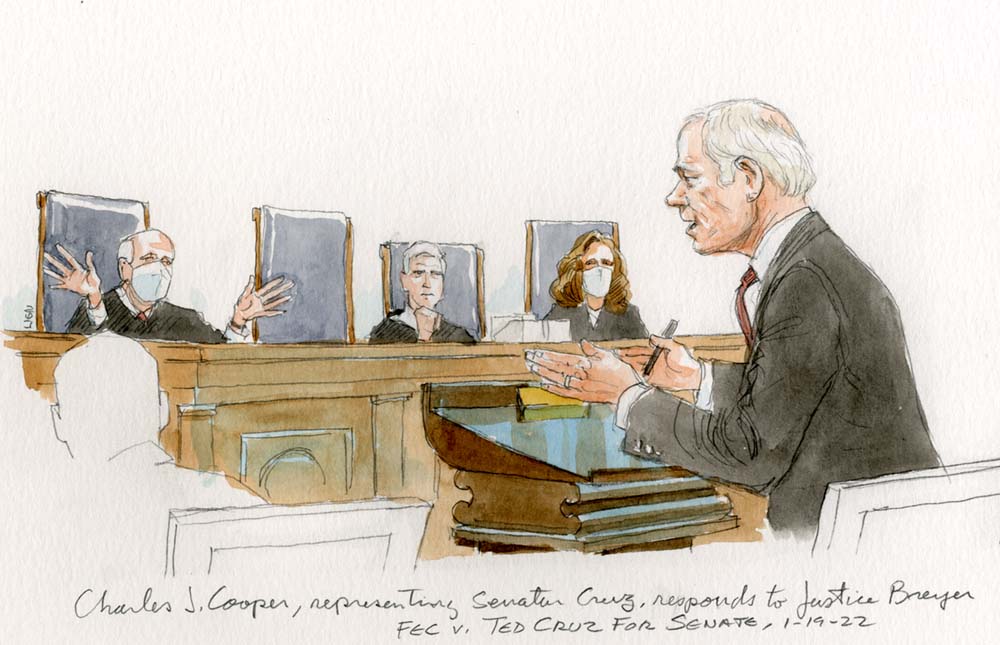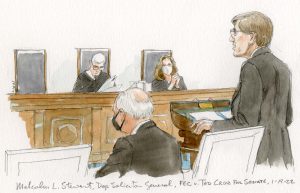ARGUMENT ANALYSIS
Government faces skeptical bench in defending campaign-finance law challenged by Ted Cruz

on Jan 19, 2022 at 7:35 pm

Sen. Ted Cruz is no stranger to the Supreme Court. In the 1990s, he served as a law clerk to the late Chief Justice William Rehnquist, and between 2003 and 2010 he returned as a lawyer to argue nine cases there. On Wednesday, Cruz was before the court in a different capacity, challenging a federal campaign-finance law that limits how and when candidates can repay loans that they make to their own campaigns. Over nearly 90 minutes of argument, the justices appeared to agree that Cruz, a Texas Republican, had a right to bring his case, but they were divided on whether the law itself is constitutional.
The law at the center of the case, Federal Election Commission v. Ted Cruz for Senate, is Section 304 of the Bipartisan Campaign Reform Act, which allows candidates to use up to $250,000 in post-election campaign contributions to repay loans that candidates make to their campaigns before the election. This meant that although Cruz could pay back almost all of a $260,000 loan that he had made to his campaign the day before the 2018 election, the remaining $10,000 was characterized as a contribution from Cruz to his campaign. Cruz then went to federal court, challenging Section 304 as a violation of the First Amendment, and a federal court agreed.
Representing the Federal Election Commission, Deputy Solicitor General Malcolm Stewart spent much of his time at the lectern arguing that Cruz and his campaign lacked a legal right to sue, known as standing, because (among other things) any injury that they had suffered was “self-inflicted.” Without Section 304 in place to challenge, Stewart contended, Cruz wouldn’t have lent his campaign money at all, or if he did he would have paid it back promptly with contributions that he received before the election.

Deputy Solicitor General Malcolm Stewart argues on behalf of the government. (Art Lien)
Stewart compared Cruz’s actions to a lawsuit brought against McDonald’s by a plaintiff who knew that the fast-food giant was selling “dangerously hot coffee” but nonetheless bought a cup and poured it on himself just so that he could sue the restaurant. “I think we’d all have the strong reaction,” Stewart told the justices, that such a lawsuit “can’t go forward” because the plaintiff’s “own deliberate conduct” in causing his injury “severed the causal link between any wrongdoing” by McDonald’s and the “ultimate injury.”
Justices from both ends of the ideological spectrum were skeptical. Justice Samuel Alito repeatedly pressed Stewart, asking him whether the premise of his argument was that someone “cannot challenge the constitutionality of a law that imposes an allegedly unconstitutional restriction on the exercise of a right if the party could have very easily satisfied the preconditions for the exercise of the right.” When Stewart answered that the government “would probably say that,” Alito was incredulous. How, he queried, “can that possibly be the law?”
Justice Stephen Breyer was also dubious. “I just don’t know of a case,” he told Stewart, challenging the constitutionality of a statute in which the Supreme Court has inquired into the relative ease or difficulty of other options when the challengers are opposed to using those options.
Chief Justice John Roberts noted that just because a case is brought as a test case does not always mean that the plaintiffs lack standing. Challenges to discriminatory housing practices, he observed, may arise after “testers” express interest in a house and are victims of racial discrimination; courts don’t require the testers to show that they actually would have bought the house before the lawsuit can move forward.
And Justice Clarence Thomas evoked Homer Plessy, the plaintiff in the landmark 1896 decision Plessy v. Ferguson, who was arrested after he refused to sit in the car designated for non-white passengers on a Louisiana train. “What would you say,” Thomas asked Stewart, “about Plessy sitting in the wrong car?”
When Stewart turned to the question of whether the loan-repayment limit violates the First Amendment, he emphasized the government’s interest in preventing corruption. But several justices questioned whether limits on loan repayment actually help to prevent corruption. Justice Amy Coney Barrett cited Cruz’s contention that the repayment of his loan “doesn’t enrich him personally because he’s no better off than he was before. It’s paying a loan, not lining his pockets.” Barrett later cited a finding by the lower court that the government had not introduced any evidence of “actual quid pro quo corruption” – that is, politicians trading favors for contributions.
Justice Brett Kavanaugh asked Stewart why another provision of federal campaign-finance law — the $2,900 limit on individual contributions — wasn’t enough to address the government’s interest in preventing corruption. He expressed more skepticism later on, telling Stewart that Section 304 appeared to be a “chill” on a candidate’s ability to loan his campaign his own money: It requires candidates to choose between loaning their campaigns more than $250,000, knowing that they won’t get some of that money back, and not loaning it at all.
Representing Cruz, lawyer Charles Cooper compared post-election contributions that pay for pre-election speech to paying for dinner tonight with a credit card and then paying the credit card bill for the dinner next month.
But the court’s liberal justices were unconvinced. In Justice Elena Kagan’s view, the loan-repayment limit was more like a “restriction on how a candidate can use third parties to finance his speech, which is exactly what contribution limits are,” than it is like spending by the candidate. Kagan later made her opinion even clearer, telling Cooper that “the entire point of this law is that we start getting worried when people start repaying the candidate’s indebtedness, because that’s just another way of putting money in his pocket.” To Kagan, such a scenario “screams quid pro quo corruption.”
Justice Sonia Sotomayor echoed Kagan’s sentiment. Why, she wondered aloud, would someone want to contribute money to a candidate after he has been elected? The money won’t be used to “promote a candidate because the candidate has already won.” “And to me,” she continued, “that’s a natural quid pro quo. I’m giving because I want to draw my attention to you.”
And Roberts raised what he described as an “interesting issue,” questioning whether the case had been heard before the wrong lower court – a rare three-judge district court, convened because Cruz was challenging the constitutionality of a provision of the Bipartisan Campaign Reform Act. As part of the government’s argument that Cruz lacks standing to bring his lawsuit, the FEC contended that Cruz was in fact injured by a regulation promulgated under Section 304, which allows candidates to repay amounts over $250,000 using pre-election contributions as long as they do so within 20 days of the election.
Roberts posited that Cruz could win his case if the regulation were invalid. But, he continued, Cruz does “not have the requirement of a constitutional challenge that is necessary to trigger the three-judge district court.”
Kagan suggested that, putting the standing argument aside, the regulation’s 20-day requirement seems inconsistent with the text of Section 304, which doesn’t mention such a requirement.
And Alito asked Stewart whether the FEC was willing to concede that the regulation is invalid. The government was not, leaving the justices to deal with this issue and the other issues in Cruz’s case. A decision is expected by summer.
This article was originally published at Howe on the Court.


